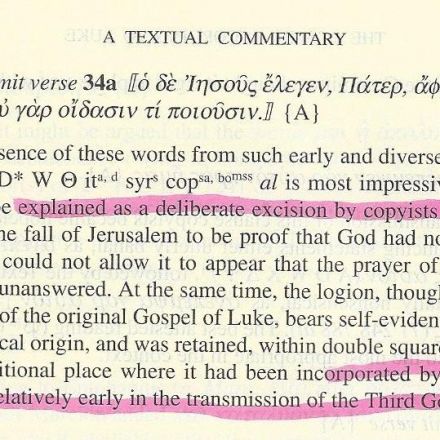

10 years ago
10
Am I evil for pointing out that Jesus was evil?
We live in a world where outspoken atheist Richard Dawkins gets called “militant” for using mere words and accurately describing the Bible god as “genocidal,” but where Jesus gets called “The Prince of Peace” for endorsing the Old Testament theocracy that was actually genocidal and for promising to personally commit atrocities infinitely worse than every 20th century dictator *combined.*
Continue Reading


























Join the Discussion
Who know what "Jesus" said or didn't say? The bible is a mish mash of old religious episodes (the flood, the garden, the resurrection and so many others) that has been rewritten and edited to suit the church power structure and politics of the day so many times there is no reality left in it. Might as well pray to the Tooth Fairy.
Given that it's unlikely he existed in the first place, it's not more relevant than what Harry Potter said or didn't say.
And also a racist.
The problem I hit when I deal with this topic is that I have come to accept, from my understanding, that morality is very much relative. I believe that without an absolute unchanging source of morality, there is no way to define what is absolutely evil. I often get a lot of flak from all side for this one because almost everyone from all groups believe in certain things being absolutely evil, and because there are certain things that overlap in many (but not all cultures) it is assumed this points to proof. I must at this point acknowledge my own hypocrisy in this statement because there are things that I hate enough to tag them with the evil term too and if they occur will cause me to fume just as much as the next person. The difference is I have brought myself to a point of forcing myself to acknowledge that those are all learned reactions (which doesn't make said reactions wrong.)
My beliefs in moral relativity is not really the point here, but leads on to the point I want to make.
I bring this all up fo a reason, and that is because there is one very logical response to an article like this that I have been surprised to find Chrisians who actually believe it. That is this, god is an absolute source of good, all that is god is good. Therefore all that god does and says is good. So if god does something, regardless of what it is and how I feel about it, it is good. If god tells me it is evil to do something and then does it himself, then because he is always good, it must be assumed as not a contradiction but rather that, it is evil for us to do such thing and not for god to do it. Given that I don't really have a position of absolute good and evil to argue from aside that my cuturally taught feels say certain things are good and evil, and they have an external absolute source of morality they believe in, I find myself stuck.
I have no argument to counter such logic accept to then try convince them god does not exist, or at least the god they believe to exist does not exist because if the god they believe in truly does exist, then that logic is air tight. It's not often to find such ChristiaChristians though because it requires them having to say that certain fairly horrendous things in, todays standards, are good when god does them.
Moral relativity means that morality can vary based on circumstances, not identity. Divine command theory is the concept you're reaching for and it doesn't make allowances for circumstances. It says that anything this god says or does is correct regardless of circumstances. Moral relativity doesn't work that way.
Ya, I have never really been good at remembering the name of things :P which is why I tend to write walls of text to try get my points across haha.
Essentially the point I was trying to make is that they have a ground of absolute morality to reference which they believe in and I do not, so as long as they are happy with accepting all the actions in the bible by their source of morality as good, then I have no other means to argue with them than to start arguing the existence of that moral source they believe in.
Edit:I just skimmed through the link you included.
I don't agree with this statement. It suggests there is some set of morals that have always existed and will always exist through all communities and societies. I don't see this as true. Almost every concept we view to be evil has been at some point viewed as not evil if not good in a culture or society. We would call those communities evil but that is based on our culturally learnt "intuitive sense" where they would have been operating upon theirs. Although I personally support the morals of today's society over those that have come before, I have no objective means of saying why mine is right and theirs wasn't, just as I imagine there are things in todays society which we consider to be ok, that future societies will look upon in horror.
That they claim certainty doesn't grant their arguments validity. Having made the claim it then falls to them to meet the burden of proof. What does the source of all morality look like? How would the universe look different if it doesn't actually exist? How does there being a source of morality change people or circumstances? Are people who follow it demonstrably more moral or more successful than those who don't?
It's up to them to back their claims, not you to prove them wrong.
I fully agree with you that the burden of proof lies with them. I was more trying to state that the burdnen of proof lies in the existence of the being. The original post isn't specifically trying to disprove the existence of god and jesus but rather to bring their morality into question by equating gods actions in the bible to that of dictators. This then is coming from the argument of, assuming god exists, then he is evil. I was tying to give a perspective as to why, as long as the person believes god iss the source of morality and they accept all he is said to have done but that it is still evil for humans then they the argument made in the link does not hold. This is because they are then making a definition of god and morality which is different to our definition of morality, and unless we change our focus of discussion to the existence of that god (where in our previous discussion we had implicitly accepted his existence for argument sake), we are then stuck in an argument of definition rather than an argument of morality.
Wow text posting on your touch screen phone is not a good medium for this kind of discussion :P I really feel like this is something we'd be able to clear up quickly if we were discussing in person haha
Edit: changed difediffe to different
Yeah, posting from my tablet is a hell of a lot slower.
Even if their god were real we have no reason to assume everything claimed about it is true. We don't have to judge by its standards, we are perfectly capable of judging by our own standards and deciding for ourselves whether or not we find their claims to be true.
Divine command theory is a scam, a cop out so believers don't have to explain why their god is justified in committing atrocities we would execute anyone else over. If we had anything concrete to go by we could examine whether or not our assumptions are wrong. Since we don't we can only go with the standards available to us, not blindly accept whatever we're told just because we have no way to disprove it.
Haha, it is so weird debating this side of the topic when this is actually one of the many issues that aided in me loosing my faith a while back. But that was because I could not accept the definition of morality that I would need to accept to be ok with, I find those who can accept it to be really creepy because I make sure they know they are accepting some really messed up shit about god. It's just that if that is the god they believe exists and on top of that believe is the definition of morality then I because I accept my own morality is simply an axiom rather than an absolute, I then don't feel justified arguing from that perspective anymore and change tact. The thing is I don't think there are many Christians who truly believe it because most squirm when you start pointing out some of the things they are accepting then throw in a solid "I have faith he is good." to comfort themselves.